#FIFA World Cup Golden Ball
Explore tagged Tumblr posts
Text
Messi’s Dream Comes True In FIFA World Cup 2022 After A Long Wait
At the Lusail Stadium on Sunday, Argentina outdid themselves with a magnificent performance to win their third FIFA World Cup title. They prevailed over France 4-2 (3-3) in a penalty shootout to claim the trophy. Lionel Messi was outstanding for the team.
He scored two goals during the first 120 minutes and then coolly put the penalty kick in the back of the net during the shootout to win the game. Messi now has both major international titles, Copa America and FIFA World Cup.
Messi was the first player to step up to take the penalty kick, and he calmly and confidently converted the goal. Gonzalo Montiel, one of Messi's teammates, scored the goal that proved the game-winner, elevating Argentina to their third Football World Cup championship.
As soon as Montiel's penalty kick was completed, Messi was overcome with emotion, and his Argentine teammates rushed over to give him a celebratory hug. It was the first time in the great's career that he could win the Football World Cup.
Throughout the match, Kylian Mbappe of France gave Messi a run for his money to win a golden trophy. The attacker for France scored a hat trick to help the defending champions come back from a 2-0 deficit and then evened the match again after Messi made it 3-2 in extra time.
Must Read Our Blog On How Kylian Mbappe Ended Up Winning A Golden Boot In FIFA World Cup 2022.
It was commonly believed that the competition in Qatar would be Messi's last opportunity to compete in the Football World Cup because he was 35 years old and approaching the conclusion of his career. And if that turns out to be the truth, he saved the best for last.
He has now scored 13 goals at World Cup competition, moving him over Pele into fourth place on the all-time list of Football World Cup scorers, tied with Just Fontaine. His seven goals in this year's event exceeded Maradona's five goals in 1986's competition in Mexico.
Lionel Messi's Performance At Football World Cup
The Argentina captain competed in the 2014 final and lost to Germany by 1-0. However, the magic he produced to match in and out during his prime years playing for Barcelona did not appear to translate when he represented his country in blue and white stripes.
After scoring 7 goals and registering 3 assists in the 2022 event in Qatar, there was little doubt about who would be awarded the honor of being presented with the FIFA World Cup Golden Ball. The honor is presented to the best player in the tournament.
Lionel Messi is the winner of the Golden Ball, making him the only player in the annals of the competition to have won the trophy on two separate occasions. He was selected as the most outstanding player in 2014 when Argentina's team came in second place behind Germany.
The Argentine, who is 35 years old, has won a record seven Ballon d'Or trophies, presented by the French news magazine France Football to the best international soccer player of the year. The Argentine also has a completely loaded trophy case.
Now that Lionel "Leo" Messi has won the FIFA World Cup, his reputation as one of the best players in the history of his sport is likely to be cemented in the eyes of the majority of soccer fans. The World Cup trophy was the one significant missing piece until Sunday.
Finally, Lionel Messi and Argentina won the penalty shootout against France by a score of 4-2 following an extra-time thriller. However, Messi has never set out to become the player regarded as the GOAT, an acronym that stands for the best player of all time.
Lionel Messi’s Football Career And Achievements
According to Messi, when he was a kid, he didn't fantasize about being a soccer superstar; rather, he focused on accomplishing small goals, finishing one at a time before moving on to the next. Messi is quoted as saying, "I fought for my dreams."
Even as a small child diagnosed with growth hormone insufficiency at 11, Messi has always been a good athlete. However, the superstar, who measures only 5 feet 7 inches, is unwavering in his assertion that a strong work ethic has been the primary factor in his ongoing success.
Messi said, "Initially, I wanted to make a living as a professional player. After that, I challenged myself to improve and set fresh objectives for each new year." According to his previous interviews, he puts in long hours of practice to maintain his level of play on the soccer field.
And even though he had been known for a long time as a superstar worldwide, it took him approximately 16 years and five World Cup competitions until he finally won the elusive title. He has ultimately fulfilled his dream and won the Football World Cup 2022.
Along with the substantial revenue he's raked in throughout his 18-year career, the new trophy is a welcome addition to his already impressive collection. According to Forbes, he has over $130 million in earnings for this year, making him the highest-paid athlete in the world in 2022.
According to estimations provided by Forbes, this figure takes into account a base income of approximately $75 million from his club team, Paris Saint-Germain, and $55 million from endorsements and other off-field pursuits.
Being the best can result in significant financial gain. But Messi insisted that being one of the sport's all-time greats was never his intention; instead, he attributed his success to his efforts over a long period, allowing his natural ability to shine through.
Lionel Messi - The Golden Ball Receiver In The FIFA World Cup 2022
After each FIFA World Cup, various awards are presented to players who have distinguished themselves throughout the FIFA World Cup tournament. The Golden Gloves and the Golden Boot are two of the most significant awards that may be won in this competition.
The Golden Ball is given to the player with the most impressive overall performance, including the goals scored and the outstanding abilities displayed. The player who finishes the competition having racked up the most points and goals, is awarded the Golden Boot.
The Golden Ball award for best player in the FIFA World Cup 2022 goes to Lionel Messi of Argentina for his remarkable performance. Messi will not compete in another World Cup after the 2022 FIFA World Cup. So, it was his last chance, and he finally got it.
The Golden Ball award at the FIFA World Cup was first given out in 1982 alongside the Golden Boot trophy, and ever since then, it has been presented at every football competition. This honor has only ever been bestowed upon a single keeper (Oliver Kahn in 2002).
A FIFA technical committee compiles a short list of players, and then a group of media representatives cast their votes on the candidates from that list. Every player is still eligible for the honor, even if they weren't a part of the squad winning the championship.
Italy, Argentina, and Brazil have all amassed ten victories, making each country the most successful in the competition. Because of the numerous instances of game-winning brilliance they have contributed along the way, Messi and Mbappe were the two leading contenders.
Kylian Mbappe, the renowned French attacker, was tied for first place with Messi for the most goals scored in this tournament with five goals. In addition to scoring goals, Mbappe has been able to assist his teammates on two separate occasions.
Kylian Mbappe was a great possibility to compete for the Golden Ball because he had an accuracy percentage of 83.4%. But, unfortunately, the award can be won by only one person. And this time, Messi got that luck and finally received the prestigious Golden Ball Award.
Final Words
Overall the Football World Cup 2022 Finals in Qatar was a heart-throbbing, thrilling match full of excitement. Football lovers will remember the team's contribution along with Messi's performance. Keep waiting for the next round of excitement in the USA, Canada, and Mexico.
#FIFA World Cup 2022#FIFA World Cup#Lionel Messi#Football World Cup#FIFA World Cup Golden Ball#Football World Cup 2022 Finals in Qatar
1 note
·
View note
Text
wtf kind of fucked up FIFA rule states that individual awards can only be given to the finalists???
#i mean what the actual fuck#emi you did good today but bounou or livakovic deserved the golden glove more than you man#this is so unfair#golden ball should've gone to modric or amrabat or ziyech#classic fifa mtfkery#unbelievable#fifa world cup 2022 qatar#fifa world cup#fifa wc 2022#croatia nt#Argentina nt#morocco nt#qatar wc 2022#wc 2022#bon gets aag bagoola
56 notes
·
View notes
Text
FIFA Women's World Cup 2023 Award Winners
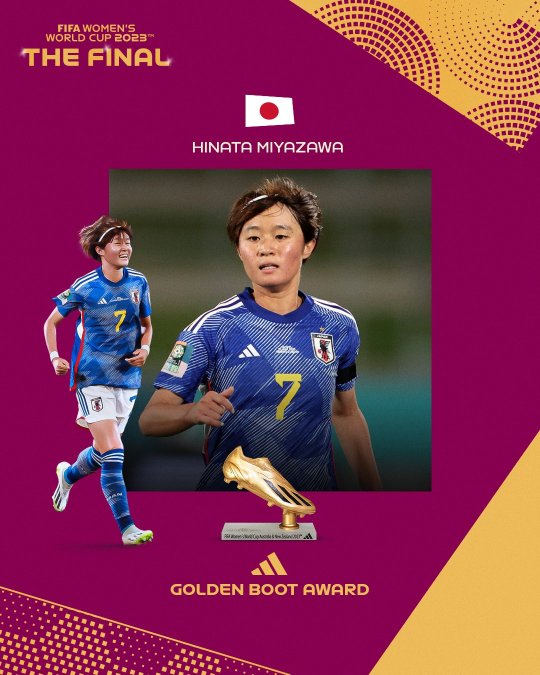

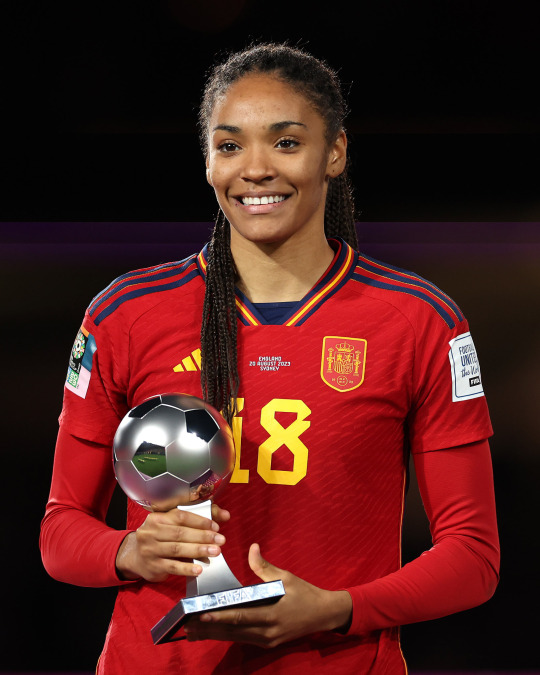
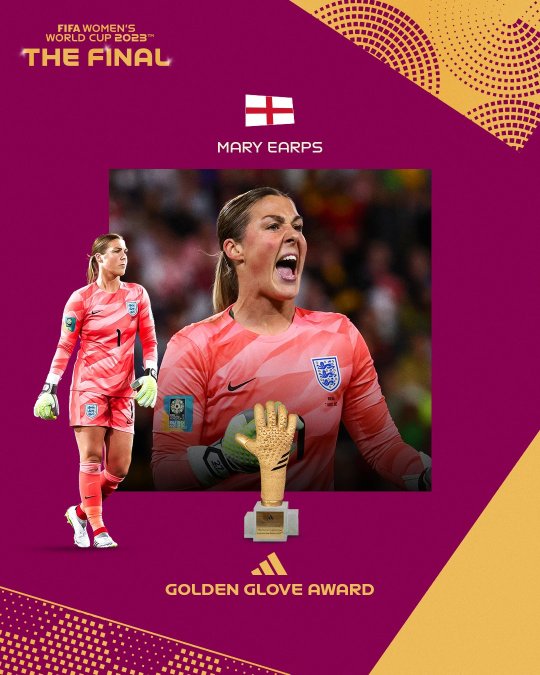
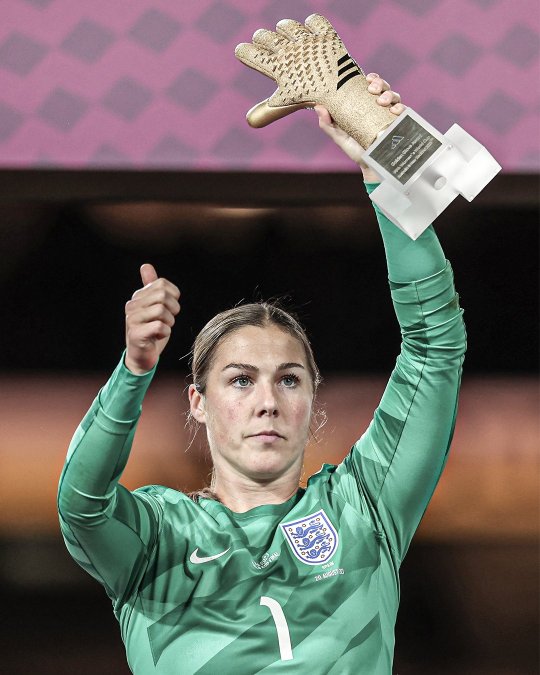

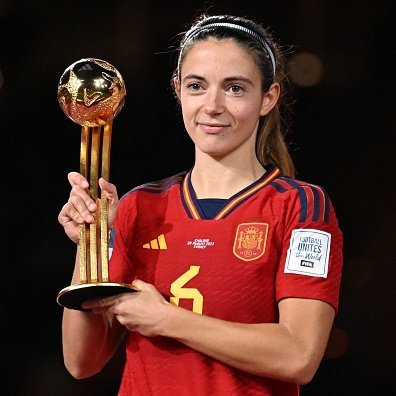
#2023 women's world cup#fifa women's world cup#FIFA Women's World Cup 2023 Award Winners#Golden Boot#hinata miyazawa#Best Young Player#salma paralluelo#Golden Glove#Mary Earps#Golden Ball#aitana bonmati#footbal#fußball#fussball#foot#futbol#futebol#soccer#calcio#voetbal#fotboll#fodbod
6 notes
·
View notes
Text
World Cup Golden Ball: Top 5 Players Who Can Win Best Player Award
Who will win #WorldCup #GoldenBall2022? #Lionel #Messi and @KMbappe are among the top 5 candidates. They will not give out the #GoldenBallAward that honors the #BestPlayer at the #WorldCup2022 until after all the games at #QatarWorldCup2022 have been played.
(more…)

View On WordPress
#2022 Fifa World Cup#Achraf Hakimi#Antoine Griezmann#FIFA World Cup#Kylian Mbappe#Lionel Messi#Luka Modric#Qatar World Cup 2022#World Cup#World Cup Golden Ball
3 notes
·
View notes
Photo
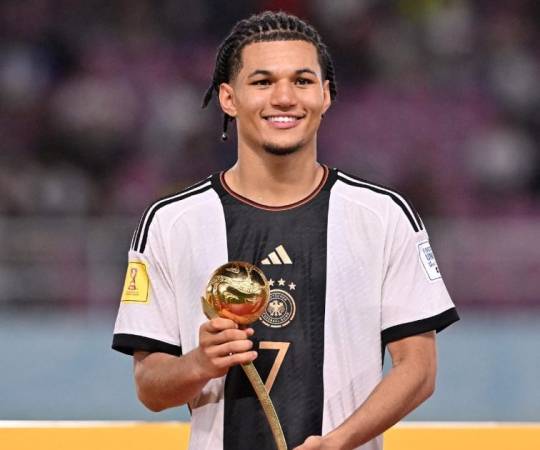
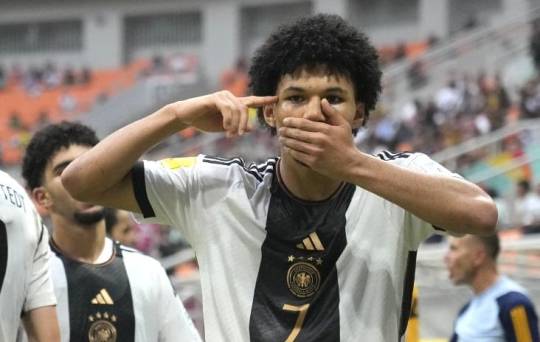
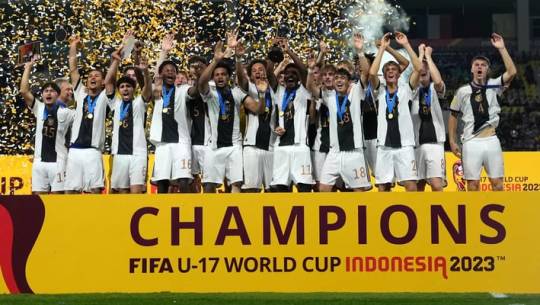
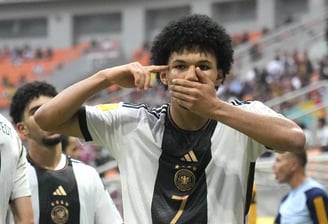
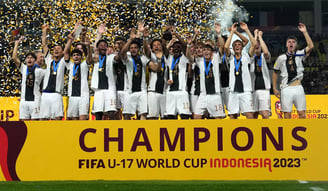
(via Who is Paris Brunner, the Golden Ball winner at the FIFA U17 World Cup 2023 for Germany? | Buzz Meter - Unlock a World of Knowledge)
1 note
·
View note
Text
Congratulations argentina !!
tho if france managed to score the last two goals and save at least one of argentina's balls in the tie-breaker theyd have won
also yes im aware this is practically a day late, but the match continued till after 12am and i had to ✨ study✨ this morning
france shouldve had more supporters ngl. their team was pretty amazing
~a france supporter if that wasnt obvious
#fifa world cup 2022#argentina#fr tho france needs more supporters#also did yall see mbappe#he was so good#like i respect that man sm#hes so good#like omg#honestly ik ill get hate if ppl see this but#he played much better than messi during the finals#like massi just kinda stood around until someone passed him the ball but mbappe ran around he entire field to get the ball#and uh messi also missed a few goals even tho all he had to do was kick upwards#mbappe was so upset at the end like did u see him#😭😭#he deserved the golden boot award he got#god why am i rambling sm lol#but yea#congrats argentina#also appearently massis not gonna retire#good for him ig
1 note
·
View note
Text
Lionel Messi Wins FIFA World Cup 2022 Golden Ball, First Player To Win It Twice
Lionel Messi Wins FIFA World Cup 2022 Golden Ball, First Player To Win It Twice
Argentina captain Lionel Messi was awarded the Golden Ball for being best player of 2022 WC© AFP The FIFA World Cup Golden Ball is presented to the best player of the tournament and after scoring 6 goals and registering 3 assists in the 2022 event in Qatar, there was little doubt who would be awarded the honour. Argentina captain Lionel Messi won the Golden Ball and thus became the first player…

View On WordPress
0 notes
Text
Brazil, for the sixth time in history, wins the FIFA Futsal World Cup!!!





With extra congratulations to the award winners...
Marlon Araújo, Silver Ball
Dyego Zuffo, Golden Ball
Marcel Marques, Golden Boot
Willian Dorn, Golden Glove
#brazil#brasil#país do futsal#fifa futsal world cup#sabiam que o brasil tem um grande muralha também? nome dele é willian#o senhor que tá abraçando o willian é o ednaldo rodrigues atual presidente da cbf :)
81 notes
·
View notes
Text



Aitana Goatmatí’s year:
🏆World Cup
🏆Champions League
🏆Liga F
🏆 Spanish SuperCup
🏆 World Cup Golden Ball
🏆 Ballon d’Or
🏆 UEFA Player of the Year
🏆FIFA The Best
🏆 IFFHS Women’s World Best Player
🏆 Laureus World Sportswomen of the year
#aitana bonmatí#aitana bonmati#woso#fcb femeni#woso community#barça femeni#barca femeni#fc barcelona femeni#espwnt#spain wnt#sefutbol fem#sefutbolfem
128 notes
·
View notes
Text
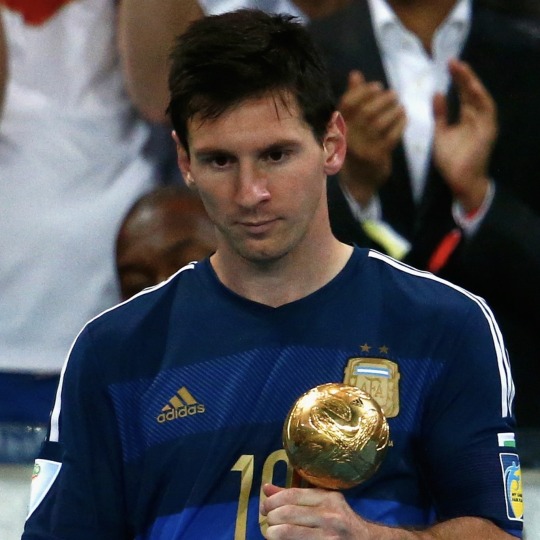
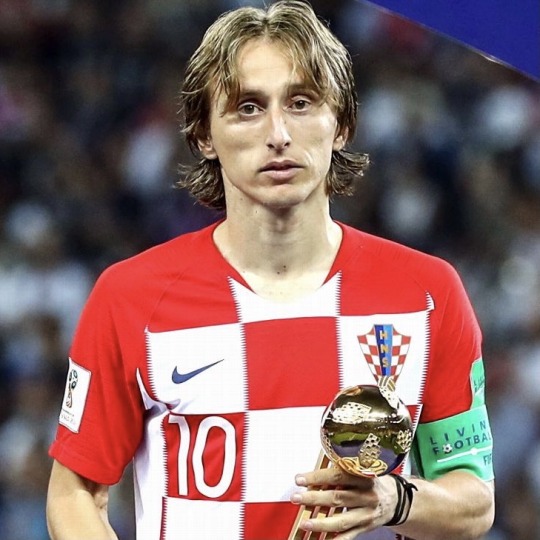

Lionel Messi in 2014, Luka Modrić in 2018, and Kylian Mbappé in 2022 with the Golden Ball or Golden Boot after losing in the FIFA World Cup Final.
#fifa world cup#world cup 2022#lionel messi#luka modric#kylian mbappe#wc 2022#argentina nt#croatia nt#france nt#fifa world cup 2022#world cup#wc22#soccer#*
484 notes
·
View notes
Text




Noa/Fem!Ego.
At Blue Lock's very beginning, Ego talked about the Japanese national character being the reason why Japan couldn't win a World Cup. But in fact... Japanese women's football team had already won the World Cup as early as 2011?
I love, love drawing sex swap (for which I repent), but in any AU I must maintain the core of a character despite the changes to worldbuilding and/or their background story — despite this core is shaped exactly by their background story. What is Ego's core? A ghost obsessed with/possessed by the world's best striker. How can I preserve his/her obsession with sex swapping? Ironically enough, the best way I can think of to keep Ego’s core is to remove him/her position as “Noa’s rival, teammate, and brother-in-arm”.
More references undercut:
I based Jinka’s career on the following two players:
Saki Kumagai (熊谷紗希), the captain of the Japanese women's football team, a defensive midfielder who plays for Bayern Munich Women's Team and has just transferred to Roma this summer. She scored the winning penalty for Japan in the 2011 World Cup. She also has seven French league titles and five European Cups to her name.
Homare Sawa (澤穂希), the former captain of the Japanese team in 2011, a striker. She scored a last-minute equalizer in extra time in the final, ultimately leading Japan to win the game through a penalty shootout. She won the Golden Ball Award as the tournament's best player and the Golden Boot Award as the tournament's top scorer. Later that year, she was named the 2011 FIFA Women's World Player of the Year, the first Asian to win a major end-of-year individual award (regardless of gender).
The appearance and name of the captain of Bastard Munich Women's Team is based on Karin Danner, the legendary manager who laid down the foundation of Bayern Munich Women’s Team.
The characters for Jinka (甚佳) means "Excellent". I don't know Japanese, but I’d like to retain the way characters is written for "Jin" (even it is regarded as masculine) and the rhyme of his name. I hope this name makes sense.
The flashback scene at the end is based on Bayern Munich men’s and women’s teams’ double championship party in 2023 (as both won the Bundesliga). I absolutely adore their khaki vests and white shirts. Stunning.
#blue lock#bllk#ego jinpachi#noel noa#jinpachi ego#noa x ego#blue lock fanart#bllk fanart#xillionart
108 notes
·
View notes
Text

#22 Cal Blanks #16 Pitt 1-0
Bears Win ACC Home Opener
Dimry Nets First Career Goal
BERKELEY – The No. 22 California women's soccer team became the first Cal program to win an ACC contest on home soil, defeating No. 16 Pitt 1-0 Thursday afternoon at Edwards Stadium. Sophomore forward Soleil Dimry provided the game-winning goal in the 47th minute, the first score of her career. It was a day of firsts for the Golden Bears (9-1-2, 2-0-1) who earned their first ACC shutout and first ranked win of the season in the program's inaugural conference home opener. Cal has now won eight of its last nine matches and has gone 10 straight contests without a loss. Pitt (7-3-1, 1-2-0) won the shot battle 11-3 and put five shots on goal, but Golden Bear goalkeeper Teagan Wy kept a clean sheet in her first game back from a bronze medal performance with Team USA at the U20 FIFA Women's World Cup. The junior collected a season-high five saves, including a couple of highlight, game-saving efforts.
After taking just one shot in the first half, the Bears sent out a more offensive-centered lineup to start the second half with senior Velize King and Dimry hitting the field first. Dimry, who has missed a lot of time this year due to injury and did not play a single minute in the first period, wasted no time providing her team with some offense in the 47th minute. King beat the Pitt defense down the right touchline and centered it for Dimry who fired it into the bottom left corner of the goal. The shot rolled just past diving Pitt keeper Ellie Breech and into the net giving the Bears a 1-0 lead.
King now ranks second on the team with three assists on the year and third with seven points. The entire match was a physical battle, and the pace picked up even more following Cal's early second-half score. The Panthers got off six shots and had a handful of solid looks, none more than Sarah Schupansky's rifle of a shot from outside of the 18-yard box with under two minutes to play. The Pitt senior forward curled a ball perfectly towards the upper right corner of the Cal goal with her left foot, but had her chance foiled by Wy who made an incredible leaping save.
The Bears are back at Edwards Stadium this Sunday for a matchup with the Miami Hurricanes. Kick off is set for 1 PM on ACC Network Extra.
#Go Bears!#UC Berkeley#Roll on you Bears#Cal sports#This Is Bear Territory#Go Bears#California athletics
14 notes
·
View notes
Text

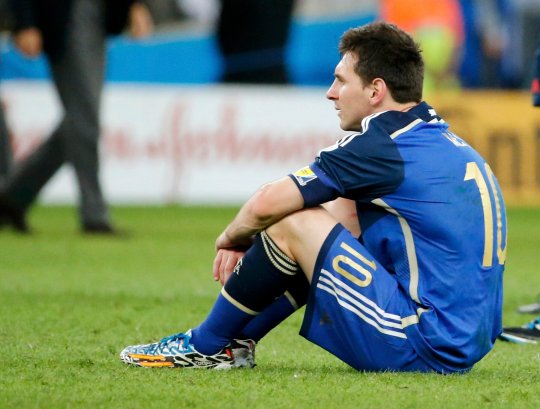
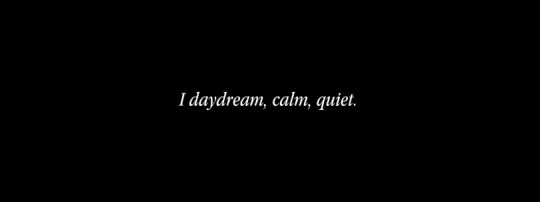
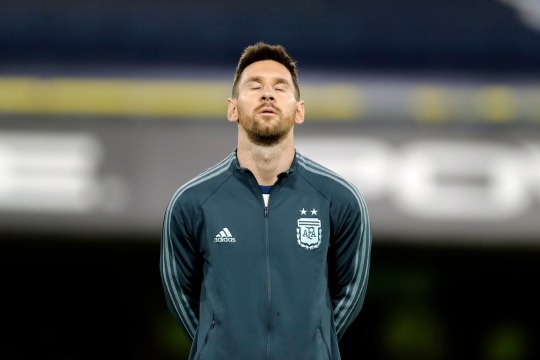


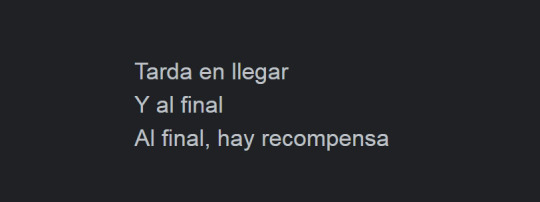
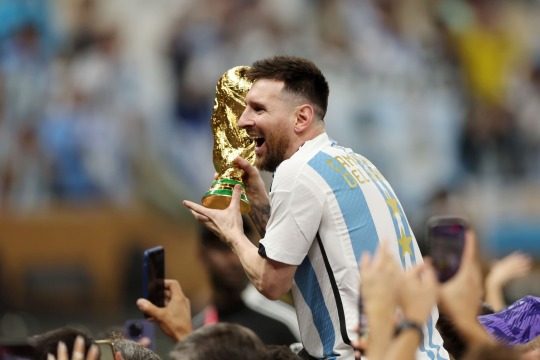




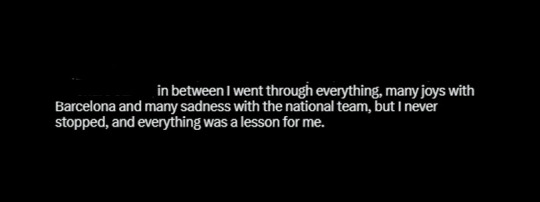
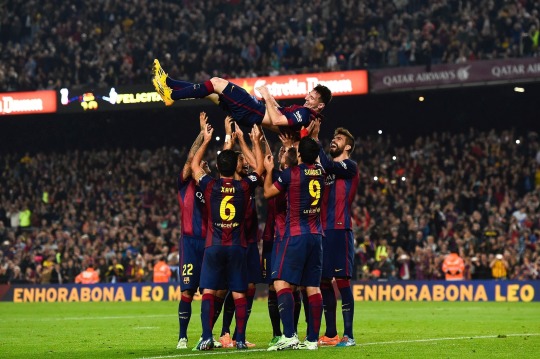
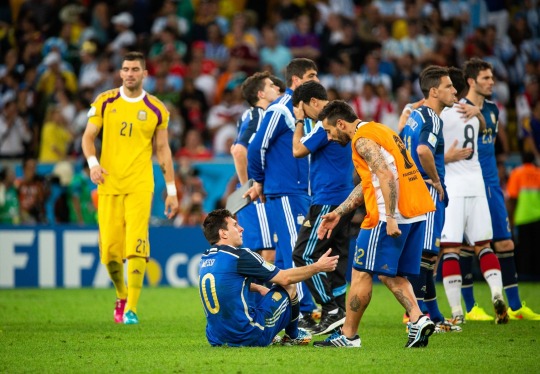


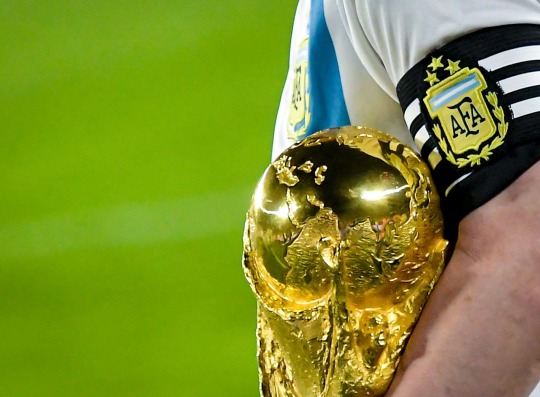
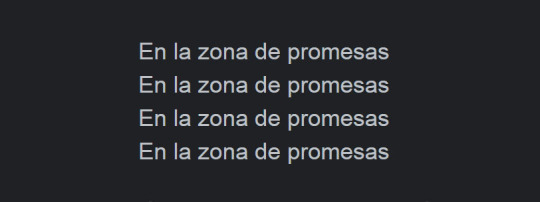

(1) Zona de promesas, song by Mercedes Sosa. (trans: "mom knows well, i've lost a battle) / (2) Copa América Final: Lionel Messi Tries to Slay His Ghosts - The New York Times / (3) Clarice Lispector, from the complete stories: 'one day less' / (4) Lionel Messi of Argentina closes his eyes during the national anthem prior to a match between Argentina and Paraguay as part of South American Qualifiers for Qatar 2022 at Estadio Alberto J. Armando on November 12, 2020 in Buenos Aires, Argentina. (Photo by Juan I. Roncoroni) / (5) Against Silence, Frank Bidart / (6) Lionel Messi of Argentina lifts the FIFA World Cup Qatar 2022 Winner's Trophy during the FIFA World Cup Qatar 2022 Final match between Argentina and France at Lusail Stadium on December 18, 2022 in Lusail City, Qatar. (Photo by Julian Finney) / (7) Zona de promesas, song by Mercedes Sosa. (trans: it takes time to arrive and in the end, in the end there is a reward) / (8) Lionel Messi of Argentina celebrates with the FIFA World Cup Qatar 2022 Winner's Trophy after the team's victory during the FIFA World Cup Qatar 2022 Final match between Argentina and France at Lusail Stadium on December 18, 2022 in Lusail City, Qatar. (Photo by Lars Baron) / (9) Lionel Messi speech after winning the 2023 Laureus World Sportsman of the Year. / (10) Lionel Messi of Argentina kisses the FIFA World Cup Qatar 2022 Winner's Trophy while holding the adidas Golden Boot award after the FIFA World Cup Qatar 2022 Final match between Argentina and France at Lusail Stadium on December 18, 2022 in Lusail City, Qatar. (Photo by Julian Finney) / (11) Tumblr textpost. / (12) Lionel Messi of Argentina celebrates with teammates after their fourth and winning penalty by Gonzalo Montiel in the penalty shootout during the FIFA World Cup Qatar 2022 Final match between Argentina and France at Lusail Stadium on December 18, 2022 in Lusail City, Qatar. (Photo by Maddie Meyer) / (13) Lionel Messi speech after winning the 2023 Laureus World Sportsman of the Year. / (14) Lionel Messi of FC Barcelona celebrates with his teammates after scoring his team's fourth goal during the La Liga match between FC Barcelona and Sevilla FC at Camp Nou on November 22, 2014 in Barcelona, Spain. Lionel Messi beat the number of goal in the Spanish La Liga of Telmo Zarra scoring his 252nd goal. (Photo by David Ramos) / (15) Lionel Messi is offered a hand by teammate Ezequiel Lavezzi of Argentina after the finial whistle and defeat at the World Cup Final match between Germany (1) and Argentina (0) at the Maracana Stadium on July 13, 2014 in Rio de Janeiro, Brazil (Photo by Simon Bruty) / (16) Lionel Messi speech after winning the 2023 Laureus World Sportsman of the Year. / (17) Lionel Messi greet fans during a victory parade of the Argentina men's national football team after winning the FIFA World Cup Qatar 2022 on December 20, 2022 in Buenos Aires, Argentina. (Photo by Gustavo Pagano) / (18) Lionel Messi of Argentina holds the FIFA World Cup trophy during World Champions' celebrations after an international friendly between Argentina and Panama at Estadio Mas Monumental Antonio Vespucio Liberti on March 23, 2023 in Buenos Aires, Argentina. (Photo by Marcelo Endelli) / (19) Zona de promesas, song by Mercedes Sosa. (trans: in the zone of promises) / (20) Lionel Messi of Argentina shoots the ball during the FIFA World Cup Qatar 2022 Group C match between Argentina and Mexico at Lusail Stadium on November 26, 2022 in Lusail City, Qatar. (Photo by Fu Tian).
#i don't think i'll ever forget about this#cried with the pic with everyone running after montiel's pen ngl#lionel messi#leo messi#messi#arg nt#argentina nt#seleccion argentina#selección argentina#web weaving#qatar 2022
89 notes
·
View notes
Text
2023 Women's World Cup records
In addition to breaking numerous worldwide social media and viewing records, the 2023 Women's World Cup set and broke a number of unique tournament records as well. The players and teams that participated in this WWC should all feel extremely proud for the history they have made. Their performances continue to show the world that these athletes are capable of so much more than they are ever fully recognized for.
First team from their nation to qualify for a men’s or women’s senior FIFA tournament: Vietnam WNT 8 nations had their debuts for first time appearing in a FIFA women’s World Cup: Haiti, Portugal, Zambia, Vietnam, The Philippines, Republic of Ireland, Morocco, and Panama. Canadian midfielder Quinn starts for Canada and becomes the first non-binary athlete to play at a FIFA World Cup.
Christine Sinclair (Canada) and Marta (Brazil) become the 3rd and 4th players in history to appear in 6 World Cup competitions men or women, with Homare Sawa (Japan) and Onome Zeno (Nigeria) being the other two. The player with the record for most world cup appearances in history remains Brazil’s Formiga, the only player to compete in 7 world cups (men or women).
Kristine Lilly still holds the record for most WC appearances by men or women with 30 games played - a record set and held since 2007. Followed by Formiga with 27 as of 2019 and Lionel Messi with 26 as of 2022. Brazil’s Marta still holds the all time leading record for most goals scored across all World Cup competitions with 17 goals in 23 appearances across 6 tournaments.
Zambia’s Lushomo Mweemba scores the fastest goal of this year’s tournament in group stage at 2min 11 sec, also marking Zambia’s first ever world cup goal in their debut. The fastest goal in a FIFA Women’s World Cup has stood for over 30 years - it remains the goal scored by Lena Videkull of Sweden, who scored after just 30 seconds against Japan in the inaugural 1991 tournament. Zambia’s Barbra Banda scores the 1000th goal in WWC history. Nouhaila Benzina of Morocco becomes the first Women’s World Cup player to wear a hijab.
Ary Borges of Brazil scores a hat trick in her WWC debut and the first hat trick of the tournament. First Caribbean nation to reach the round of 16 in WWC history - Jamaica First Arab nation to qualify for a WWC and reach the round of 16 in WWC history - Morocco Of the eight debutants, Morocco was the only one to advance to the round of 16. Two teams reached the round of 16 having conceded no goals so far in the tournament- Japan and Jamaica.
First time four African nations have been represented at a WWC with three of them qualifying for the knock out stage at this years competition - South Africa, Morocco, and Nigeria. 3 of the 4 African nations appearing in this year’s WWC all finished 2nd in their groups (Morocco, South Africa, and Nigeria). The US suffered its earliest elimination in WWC history, getting knocked out in the round of 16. The U.S. has never finished below 3rd place in all previous editions of the competition. Sweden’s Zećira Mušović sets a new record for most saves in any WWC 2023 game with 11 saves vs the US in the round of 16.
First manager to lead two different nations to a World Cup final (Netherlands and England)- Sarina Wiegman First goalkeeper to take and convert a PK in a WWC penalty shootout - Alyssa Naeher
Golden ball (best overall player of the tournament) - Aitana Bonmatí Silver ball - Jenni Hermoso Bronze ball - Amanda Ilestedt Golden boot (most goals scored in the tournament) - Hinata Miyazawa (5 goals) Silver boot - Kadidiatou Diani Bronze boot - Alexandra Popp Golden glove (best goalkeeper of the tournament) - Mary Earps
FIFA young player award (best player of the tournament under 21 years old) - Salma Paralluelo FIFA fair play award (team with best record of fair play during the tournament) - Japan Best mascot of the tournament (unofficial) - Waru Longest penalty shootout in World Cup history (20 penalties taken) - Australia vs France quarter final
The 2023 competition was hosted by Australia and New Zealand, making it the first edition to be held in the Southern Hemisphere, the first Women's World Cup to be hosted by two countries, and the first FIFA senior competition for either men or women to be held across two confederations (Asia and Oceanic).
First edition of the women’s tournament to feature an expansion to 32 teams and 64 matches, and largest women’s sporting event in history with 32 teams and 736 players. Only team to play all matches (group stage + knockout) undefeated with a 6-0-0 record - England All 4 previous winner nations (US, Germany, Norway, and Japan) were eliminated before the semifinal stage, marking the first time this has happened in the competition’s history.
For the first time in its 32 year and 9 tournament history, the WWC has a new champion (Spain) and new runner up (England) in 2023, with both nations never having made it to the final stage before. Only the 2nd nation in history to win both a men’s and women’s World Cup - Spain Top scoring country at the 2023 WWC - Spain with 18 goals First time a senior English football team has made it to a WC final in 6 decades - England WNT
First time advancing past quarterfinals in their WWC history and first host nation to advance to semifinals in 20 years - Australia placed 4th place for best in all 8 WWC competitions they’ve participated in and broke attendance records through all stages of the tournament, with an overall stadium attendance across all matches at 1.978 million. More than 1.5 million tickets were sold for the WWC, surpassing the entire tournament’s projected target in the first 5 days alone.
Two attendance records were broken for both host nations on day one of the WWC - largest crowd ever for a men’s or women’s football game in New Zealand (42,137) and largest crowd ever for a women’s football game in Australia (75,784).
Brazil's opening match v Panama was simulcast live on TV Globo and SporTV, delivering a combined audience of 13.9 million viewers - higher than any audience in the territory during the 2007, 2011, and 2015 WWC. China v England produced the highest audience for a single match, reaching 53.9 million viewers, becoming the highest in any global market so far. 17.15 million people tuned into the Australia v England semifinal cumulatively across Channel 7, Optus Sport, venues, and live-sites, comprising approx 64% of the entire Australian population - the biggest television event not just in any sport in the country, but in Australia’s television history.
The record for highest single match attendance still remains the 1999 WWC final between the US and China with 90,185 in attendance - a number that hasn’t been reached since the men’s tournament at the 1994 WC final between Italy and Brazil at 94,194.
The largest 2023 attendances were at Stadium Australia in Sydney, which saw four capacity-crowd fixtures, including Australia's opening win over Republic of Ireland and the final between Spain and England. The crowd of 75,784 was a record home audience for a women's football match in Australia and the third largest individual crowd attendance in Women's World Cup history. Over 50% of all matches had near sell out or at stadium capacity with a total of 1,977,824 fans in attendance at the 64 games in total, setting a new record for highest overall attendance in Women’s World Cup history across all 9 editions of the tournament. Highest grossing Women’s World Cup in history with a revenue of over half a billion dollars ($570 million), surpassing the projected revenue estimate by $100 million.
#wwc23#wwc 2023#fifa women's world cup#woso#attendance and records#wwcedit#I had to throw the waru one in there#for my own heart#waru 🥺
30 notes
·
View notes
Photo

From my point of view, what's beautiful in the sport is that you don't need to know too much about tactics or anything to see. If you find something beautiful, you don't need to be an expert to know it. It's like ballet… The reason it was nicknamed 'ginga' was that normally, when we'd play against a European team…back then, the European teams were very tough and physical. They were big, and defensively solid... There were some in Brazil who thought we should make that our football culture. We would say, 'We want to dance. We want to ginga. Football is not about fighting to the death. You have to play beautifully.' And so we did, and that's the reason that Brazil created more of a show, more of a ballet… The ambition should always be to play an elegant game.
- Pelé (Edson Arantes do Nascimento)
Pelé was born on Oct. 23, 1940, his father was a professional soccer player in their native Brazil. Pelé — who was given his nickname by childhood friends because of the way he mispronounced his favourite soccer player goalkeeper Bilé - honed his craft playing futsal (or indoor soccer) in Bauru, the region within São Paulo, where Pelé grew up.
In 1956, at only the age of 15, Pelé tried out for the Santos FC professional club near São Paulo. He soon signed a contract with the team and made his professional debut on Sept. 7, 1956. In the Brazilian press, Pelé was instantly hailed as a star, with the forward leading the league in scoring as a 16-year-old in 1957. The following year, Pelé joined the Brazilian national team for the 1958 World Cup, delivering a performance that would make him a global star and earn him the nickname “O Rei,” or “The King.”
Pelé’s dominance continued through the Sixties as his Santos team won six championships in the Brazilian league over the course of that decade, while Brazil also won the World Cup in 1962 and 1970, with Pelé winning the Golden Ball for best player at the latter tournament. In his 19 seasons at Santos, spanning from 1956 to 1974 and roughly 660 games, Pelé scored a record-shattering 643 goals.
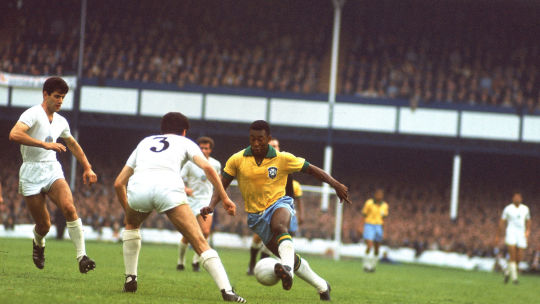
In 1975, Pelé helped ignite interest in “the Beautiful Game” - a phrase he in part popularised for the sport, inspired by his own majestic style of play — in the U.S., a country seemingly culturally impervious to soccer’s charms: The American team failed to even qualify for the World Cup between 1954 to 1986. Following nearly two decades at Santos and a brief retirement, Pelé signed with the New York Cosmos of the North American Soccer League.
Pelé’s mere presence helped the Cosmos reach record attendances, and the sport itself gained public awareness otherwise unheard of stateside. He spent three years with the Cosmos, culminating in a Soccer Bowl championship with the Cosmos in 1977. That same year, Pelé played his final game as a pro as the Cosmos hosted his former longtime team, Santos, for an exhibition match at a sold-out Giants Stadium, with Pelé playing for both teams during the game. In the near half-century following his retirement, Pelé became one of soccer’s greatest ambassadors, continuing his push to keep the “Beautiful Game” on the forefront of the world stage. He starred in soccer-related movies — 1981’s Escape to Victory and 1986’s Hotshot — and teamed with Brazilian musician Sergio Mendes on the soundtrack to a 1977 documentary about his life. He received an honorary knighthood from Queen Elizabeth as well as every other possible soccer-related accolade, from the FIFA Order of Merit to the FIFA Player of the Century to a spot on TIme’s 100 Most Important People of the 20th Century list.
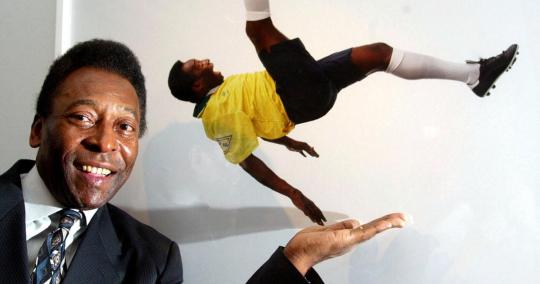
The debate over his status as the all-time No.1 is almost unresolvable, with Lionel Messi the only player to match him in Ballon d'Or awards, and the Argentine and Cristiano Ronaldo also leading him in the all-time goal race. But you can judge Pelé’s greatness by what his footballing peers - legendary players in their own time. “The best player ever? Pelé. (Lionel) Messi and Cristiano Ronaldo are both great players with specific qualities, but Pelé was better.” said Alfredo Di Stefano, the late and great Argentine star for Real Madrid. Ferenc Puskas, the legendary Hungarian footballer disagreed, “The greatest player in history was Di Stefano. I refuse to classify Pelé as a player. He was above that.” For Franz Beckenbauer, he said of Pelé “He is the most complete player I ever saw.”Rarely do the Germans see eye to eye with the Dutch such is their footballing rivalry, but for the late great Johann Cruyff, “Pelé was the only footballer who surpassed the boundaries of logic.”.
Even Ronaldo, the only player on the same level as Lionel Messi in the modern game, put the debate to rest when he declared, “Pelé is the greatest player in football history, and there will only be one Pelé in the world.”
RIP King Pelé (1940-2022)
71 notes
·
View notes
Note
https://www.codesports.com.au/football/matildas/matildas-star-caitlin-foord-and-newcastle-knights-recruit-jackson-hastings-share-enduring-bond-after-brady-bunch-meeting/news-story/154e1fc632552b2289813e227db527fc
Could you please send this
Matildas star Caitlin Foord and Newcastle Knights recruit Jackson Hastings share enduring bond after “Brady Bunch” meeting
Jackson Hastings isn’t afraid to admit it. Caitlin Foord, a central member of the Matildas’ golden generation, is not to be messed with.
“We used to always go play beach footy one-on-one and Caitlin was always faster than me,” Hastings recalls. “More talented, too. She was as tough as anything.”
Foord and Hastings grew up together in Warilla, a working class beachside hamlet 90 minutes south of Sydney. Both showed immense talent early: Foord with a football, Hastings with a footy. Occasionally, the two would cross over.
“When we used to play footy together I used to beat him pretty easily,” Foord says. “I remind him of that pretty frequently. You can follow that up with him but he’s lying if he says otherwise.” No arguments from Hastings.
“She used to make me cry a few times,” he responds. “I’m surprised she didn’t chuck that in there!”
Hastings and Foord have been friends for over 20 years thanks to a short-term Brady Bunch situation.
Jackson’s dad Kevin dated Caitlin’s mum Simone for a while. While Kevin and Simone ultimately went their separate ways, Jackson and Caitlin, plus Foord’s older sister Jamie, stayed close, hanging out at school and in their spare time together.
“Jamie and Caitlin were like the two older sisters I never had,” Hastings says. “The friendship is a lot deeper than going to school together, which I’m really grateful for.
“If [Caitlin] wanted to play rugby league and didn’t go down the path of playing football, and NRLW had come around sooner, no doubt in my mind she would have brained it. She’s tough, fast, skilful, athletic and mentally strong, too.”
Those traits have not been wasted. Foord has blazed a path from Warilla to Wembley.
When Foord was eight, longtime junior coach Mick Southwell invited the youngster along to a training program with other talented girls.
“Everything I’d heard about her, playing against boys, running rings around them, very athletic and mobile, was there,” Southwell recalls.
“And when she got out there with us, she just wanted to learn. That’s what stood out. Light on her feet, prepared to try things and run at players. Knock the ball past them and run.
“Rugby League would have helped develop that.” Football benefited.
A mere eight years after Southwell first saw her, Foord, just 16, skipped school for a month to play in the 2011 World Cup. She was named the best young player at the tournament.
Foord remains the only Australian player, male or female, to win a major award at a FIFA World Cup.
Hastings still marvels at Foord’s commitment to her craft in her formative years: a two-hour drive up the highway to Sydney every afternoon for elite training, followed by a drive home late at night. Bus to school. Repeat.
Foord credits the influence of Hastings, then a rising star in the rugby league ranks, for helping to hone her steely resolve.
“I think being able to work towards the same goals made us super focused,” Foord says. “And wanting to succeed meant we were determined in the same way.”
Hastings is like a proud little brother.
“I’ve seen her play for Warilla, Shellharbour, local teams,” Hastings says.
“Now she’s a superstar. “It’s incredible to see how far she’s gone in the sport.”
Foord has further to go. She has returned to Australia for this week’s Cup of Nations games against Czech Republic, Spain and Jamaica in dynamic form. A much-needed break last June has done wonders after an 18 month period which left Foord, and a number of other first-choice Matildas, on the verge of burning out.
Covid-19 wiped away most fixtures in 2020 but, after international football resumed in April the following year, the Matildas played 22 games, including the Olympics and Asian Cup.
In addition to increasing club commitments, like Foord has at Arsenal, the top players were fried and were granted leave for games last June against Spain and Portugal.
In the short-term, the move backfired. The Matildas were battered 7-1 by Spain and manager Tony Gustavsson’s future was once again called into question.
The decision, though, could prove to be a long-term masterstroke. Foord, in particular, has hit peak form for Arsenal and scored five goals in three games for the Matildas late last year.
“I think my goal scoring is a confidence thing,” Foord says. “I’m a confidence player. When I feel good, that reflects well on the field.” More importantly, the fearless and free version of Foord, first noticed as an eight-year-old in Wollongong, is back, terrorising defenders with her customary direct running.
Foord started this season outside Arsenal’s first XI, but forced her way in. And with key injuries to Gunners stars Beth Mead and Vivianne Miedema, she has stepped up with seven goals, plus involvement in countless others, in all competitions.
“I’ve always wanted to carry over to the national team what I can do at club,” Foord says. “That’s been my focus, when I come in, to be able to bring the same standard and level to each game and it will be the same this year as well.“
Hastings, now with the Newcastle Knights, will get to witness this first hand next week when the Matildas play Jamaica at his home-ground, McDonald Jones Stadium.
It will provide further confirmation of what he knew 20 years ago. “It’s awesome to see what she’s done for the women’s game,” Hastings says, before adding something more valuable about their relationship. “And she knows if I ever needed anything, I’d be there. And I know that would be vice versa.”
31 notes
·
View notes